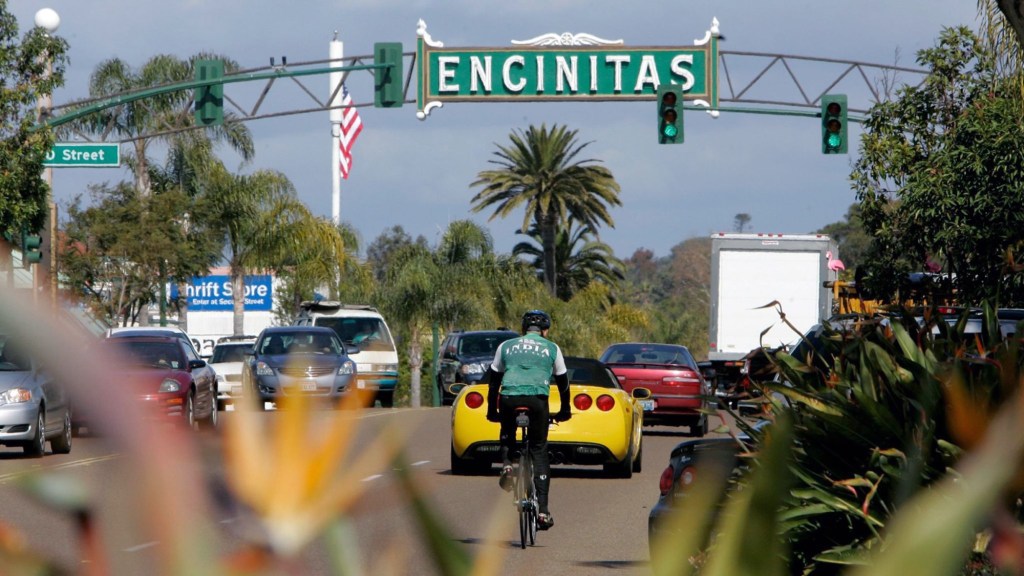Encinitas will pursue proposals to limit illegal camping on private property and sleeping in vehicles, but it won’t reduce the number of hours that RVs can park on city streets, the City Council decided Wednesday.
All three proposals were put forward by Councilmember Jim O’Hara. As he introduced them, he said he wanted to amend existing city ordinances to remove ambiguity, improve public safety and make it easier for Sheriff’s deputies, who provide the city’s policing services, to do their jobs.
“This isn’t meant to criminalize anybody, it’s not meant to expand police authority,” O’Hara said after one audience member declared during her public comments that his proposals would “further criminalize poverty and punish people for simply existing within our city limits.”
Beth Whittaker, an Encinitas resident for two decades, told the council that she strongly opposed all three proposals, saying they “echo the authoritarian impulses of the MAGA movement, which seeks to normalize surveillance, suppress dissent, and punish poverty under the guise of law and order.”
O’Hara countered that his proposed changes simply exchanged one kind of screw driver or wrench for another, saying “this tool as it stands (today) is a metric socket when you need an American socket … because it just doesn’t fit the need of what we need as a city. So, all we’re doing is taking an ordinance that already exists and making it so they can use it.”
The two changes that won council approval Wednesday now will be written up by city staff in ordinance form and then go back to the council for final approval, City Manager Jennifer Campbell said after the votes. The code amendments will go into effect 30 days after the council’s votes, she added.
O’Hara’s first proposal — eliminating the words “at night” to a ban on illegal camping on private property — received unanimous council approval. Before that vote, Sheriff’s Capt. Shane Watts, commander of the North Coastal Station, said the change would eliminate a loophole that allows illegal campers to relocate from public areas to private areas during daytime hours, and might reduce fire issues in overgrown brushy areas.
The city already has a 24-hour ban on camping in public places, but when illegal campers are asked to leave those places, they can simply relocate to private property, Watts said. He added that under the current ordinance, private property owners now personally must report the illegal activity in order for deputies to remove the campers during the day. With the elimination of the “at night” phrase, deputies will be able to handle the issue without requiring the private property owner to be present or file special paperwork, he said.
The council modified one of O’Hara’s other proposals — one on sleeping in vehicles on public streets. O’Hara had proposed changing the current 10 p.m. to 6 a.m. ban to one that ran from “dusk to dawn,” or 30 minutes after sunset to 30 minutes after sunrise. He said an earlier evening start time would make enforcement easier.
Mayor Bruce Ehlers said he could support an earlier start time, but didn’t want to use the sun as the metric — something several audience members also said was confusing. Ehlers recommended going with an 8 p.m. to 6 a.m. ban, which the council ultimately approved in a 4-1 vote, with Councilmember Joy Lyndes opposed. Lyndes said she thought the existing 10 p.m. to 6 a.m. ban was appropriate because that’s when people typically are sleeping overnight in their vehicles.
O’Hara’s third proposal — one that would have reduced the hours that RVs could park on city streets without a permit — was tabled by the council after facing opposition from residents and some council members. His proposal called for making the ban valid from 8 p.m. to 8 a.m., rather than the current 10 p.m. to 6 a.m. timeframe.
Ehlers said he didn’t want to prevent Encinitas residents from parking their RVs near the ocean at dawn so their families could enjoy a full day at the beach, while Lyndes said there was no way she could support the proposed change. Councilmember Marco San Antonio, who said he drives a Sprinter van, said he found the new proposal “a little restrictive,” and perhaps even more than that.
However, Councilmember Luke Shaffer, a surfer who parks at the beach early in the day, said he thought the proposed change could be handled in such a way that Encinitas beach-loving residents wouldn’t be significantly impacted. When O’Hara introduced the proposal, he said it would stop RV-living people from parking near area schools in the morning, and that’s a significant benefit for school children, Shaffer said.
Shaffer’s comments that he didn’t want his son or daughter walking past “slightly run-down,” “19-something” -era vehicles containing the “wrong people” who “just don’t make you feel so cozy” drew a response from Ehlers.
Ehlers said he didn’t want to craft any code amendments that targeted people based on the way they looked, adding, “Some of our discussion tonight, it sounds that way and I want to call that out and say, ‘No, that’s not the intent.’”
Shaffer later said that he wasn’t trying to stereotype people, but policing work requires some amount of profiling and when he served overseas as a U.S. Marine it was necessary to profile some people “pretty hard” for “obvious reasons.”
Originally Published: August 14, 2025 at 12:53 PM PDT
